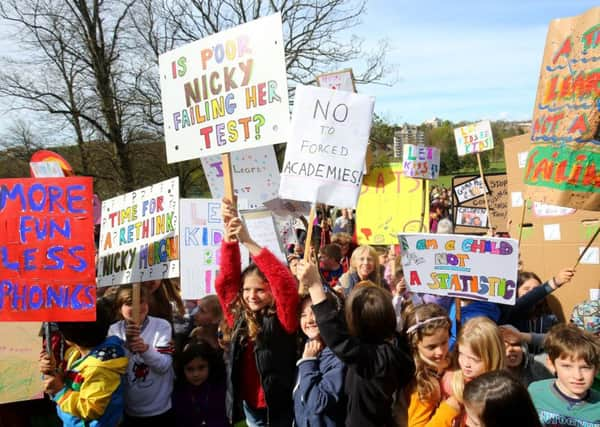YP Comment: The cycle of poor parenting. Schools left bearing the burden


On the one hand, the revelation that tens of thousands of pupils are so poorly prepared that they arrive at primary school lacking social skills, unable to speak properly and with poor personal hygiene will be seized on by those who recognise the demands placed on hard-pressed teachers. When pupils cannot even wash themselves, how can they be expected to prepare for demanding maths and language tests?
Yet, on the other hand, the telling detail in the State of Education report is that too many children are also arriving under-prepared at secondary school, with low levels of reading, writing and numeracy. This is a clear indication that pupils are still being failed by primary education, leaving junior school with problems that secondary schools are not equipped to fix and, in many cases, setting themselves up for a lifetime of low attainment.
Advertisement
Hide AdAdvertisement
Hide AdThe answer, according to the Save the Children charity, is to provide more good-quality nurseries. Yet, if parents cannot organise themselves sufficiently well to teach their children how to use the toilet, what hope is there that they can organise themselves to find good nursery education?
In the end, the unfortunate reality is that the problem of poor parenting is now too prevalent to be resolved quickly and the only hope for children who lack proper parental support is for primary schools to take up the slack.
Yes, this places an all but intolerable burden on primary teachers, who are now expected to fill every role from nursemaid to expert on English grammar. But if there is to be any hope of breaking the cycle of low achievement for poorly prepared pupils, primary schools have to enforce the highest possible standards. The alternative, of consigning yet more children to a lifetime of failure, is simply too terrible to contemplate.
Park partners: The business of preservation
tHE NOTION that national parks must remain forever cast in aspic, untainted by the hard, commercial world outside their borders, has long been a thing of the past.
Advertisement
Hide AdAdvertisement
Hide AdOn the contrary, the long-term sustainability of parks such as the Yorkshire Dales depends on a mutually beneficial relationship with business. For one thing, of course, the very beauty of the landscape depends on the hard work of those most doughty of businessmen, farmers.
And for another, it is now recognised that, if farms are to continue as viable businesses, then national parks need development in the form of low-cost housing and a variety of commercial lifelines to sustain their communities.
The fact that, with sensitive development, these aims can be achieved without changing the precious character of a landscape such as the Dales or the North York Moors is also generally acknowledged. So it is only sensible for the arrangement between national parks and business to be formally recognised in a new organisation, the National Parks Partnership.
As Dales National Park Authority chairman Peter Charlesworth says, today’s financial realities mean that there must be much more collaboration between business and national parks.
Advertisement
Hide AdAdvertisement
Hide AdIndeed, far from damaging the parks’ appeal, the involvement of greater commercial expertise along the lines set out in the new partnership should ensure that businesses and parks alike will both benefit and that public appreciation of these dramatic landscapes will rise to even greater heights.
Giving thanks. A win for prayer and pedal power
AS YORKSHIRE’S cyclists pedalled to St Michael’s Church, Coxwold, yesterday to give thanks for the pleasures of cycling and the glories of the countryside, they may have reflected that, this year more than ever before, their prayers are being answered.
When the first Coxwold Sunday was held in 1927, cycling may have been even more prevalent and the countryside even more unspoiled. But the churchgoers on that first Coxwold Sunday could never have foreseen the way in which their sport would become synonymous with their beloved county.
The success of the Tour de France’s Grand Départ and the subsequent Tours de Yorkshire, however, have put cycling at the forefront of the county’s sporting culture. And with the weather for yesterday’s service hopefully a glorious harbinger for summer cycle rides yet to come, all in all there is quite a lot to be thankful for.